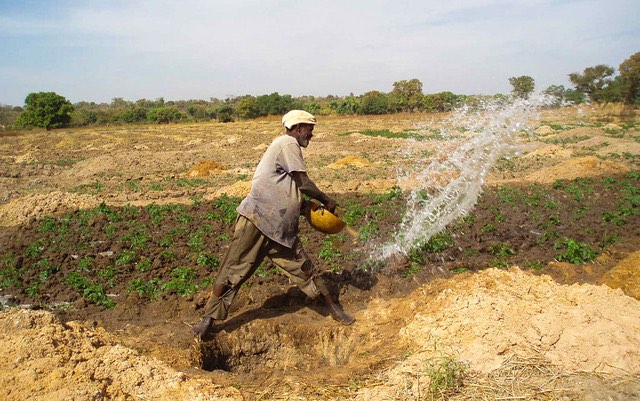Food crises continue to plague the African continent, driven by conflict, climate change, and economic turbulence. Around 33 million people from 10 countries in Africa experienced acute hunger in 2018 due to conflict and political instability, while climate shocks put another 29 million from 20 countries into situations of acute food insecurity, according to the 2019 Global Report on Food Crises.
A new policy brief for the G20’s think tank platform, the T20, suggests that massive investments in expanding irrigation in Africa’s arid and semi-arid areas, and in improving weak and missing links in food systems, could provide the key to building resilience to future food crises. Such investments would provide Africa’s poor and agrarian populations with opportunities to break away from poverty and tap the economic potential of the world’s growing demand for food.
The brief was prepared by experts from IFPRI, the UN Food and Agriculture Organization (FAO), and the Japan International Cooperation Agency (JICA). They provided three concrete recommendations for the G20 in three priority areas of action:
- Investing in irrigation. Studies by IFPRI have shown the enormous potential of small-scale schemes to increase irrigation in Africa South of the Sahara by up to 30 million hectares. This would extend the growing season and provide year-round incomes for poor farming households and smallholders. The surplus production would result in rapid growth of the agriculture sector and help transform African economies. The brief proposes that the G20 and the African Union call on multilateral financial institutions, such as the World Bank and the African Development Bank, to set up financing schemes to help governments, farmers, and farmer organizations with the necessary funding.
- Investing in strengthened agro-food value chain links. The policy brief encourages the G20 to foster international collaboration and strengthen financing mechanisms to facilitate a “big investment push” in Africa’s food value chains. To reap the benefits of agricultural productivity growth from irrigation investments, better supply chains will be needed for farmers to bring their increased production to market. This will require investments to improve market infrastructure and other innovations such as temperature-controlled storage and transportation and food processing capacity. Longer growing seasons and more surplus production would enable a growing number of small firms to produce processed versions of local staples. Such growth would in turn promote increasing demand, driven by income growth and urbanization, for processed, perishable, and higher value foods—transforming African food systems. Such investments could also leverage large-scale job creation along food supply chains and reduce the pressures that lead to migration.
- Realigning agricultural incentives and trade policies. Producer prices are set below the world average in many African countries, depressing farmers’ incomes. Some African countries also prioritize domestic food self-sufficiency and government-managed trade, both of which can result in domestic price instability in the event of weather shocks and related climate impacts. When such disasters strike, increasing imports will not be enough to offset reduced food supply. The policy brief recommends that the G20 should collaborate with the African Union to coordinate reforms of domestic agricultural support measures and limit existing food trade restrictions. The Continental Free Trade Area in Africa could also help countries diversify their food supplies, ensuring that neighboring countries make food supplies available when needed to decrease Africa’s exposure to shocks to its largely rain-fed agriculture.
The T20’s recommendations stress the need for massive investments to make Africa’s agriculture and food systems more resilient to food crises.
Read the T20 policy brief here.
Rob Vos is Director of IFPRI’s Markets, Trade, and Institutions Division (MTID); Swati Malhotra is an MTID Communications Specialist.







